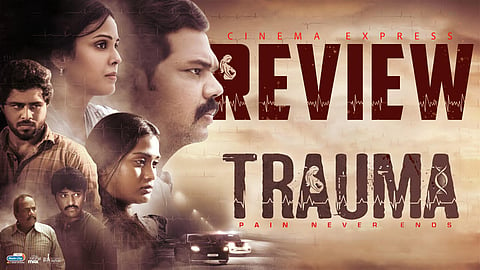Trauma Movie Review: This medical mafia thriller lives up to its title
Trauma Movie Review(1 / 5)
Actor Sanjeev, who plays police inspector Ajay Kumar in this film, advises Vivek Prasanna's Sundar that having a child alone doesn't make one a—he also needs to take care of the child. He adds that it is better to adopt an orphaned child than to spend lakhs in fertility centres. Director Thambidurai Mariyappan turns what could have been a social media post, into a film that never really takes off.
Trauma begins with the police discovering a corpse during a routine vehicle check. The scene then shifts to the past, showing us what led to this murder by introducing the lives of the childless couple, Sundar and his wife Geetha (Chandini Tamilarasan), and lovers Selvi (Poornima Ravi) and Jeeva (Prathosh). How their lives and desires led to this crime forms the crux of the story.
Trauma feebly attempts to be a hyperlink film but falls short. Unfortunately, the makers seem to believe that having a common character connecting two different stories is enough to qualify the narrative as a hyperlink. Characters from the parallel storylines barely cross paths. As a result, the screenplay unnecessarily pivots between these stories when neither contributes emotionally or logically to the other. The film would have been more effective as a focused story about one childless couple and a medical mafia group that turns their lives upside down. Instead, the idea of a hyperlink comes off as a gimmick, used only to shift between narratives whenever one thread becomes dull, giving the illusion of complexity when there’s none.
Likewise, logical errors also plague the film. The most glaring of these is the fact that the last rites are performed on a corpse that died under suspicious circumstances. In reality, no final rites would be conducted without a thorough investigation and autopsy. This critical lapse in logic makes it difficult to take the narrative seriously. Also, you don't find a drop of blood on someone whose throat was just slit. Moreover, the police investigation appears perfunctory, almost as if the procedural aspects were included merely as a formality to add tension. We are confused about whether to treat the identification parade scene seriously, as for whatever reason, the director decides to treat it in a humorous way, which unfortunately fails as well. The lack of authentic police work makes the murder mystery element unconvincing and hollow.
Director: Thambidurai Mariyappan
Cast: Vivek Prasanna, Chandini Tamilarasan, Poornima Ravi, Prathosh
The comedy sequences further derail the narrative. Forced and unfunny, these scenes feel like fillers, inserted without any organic connection to the story. The humour not only fails to land but also disrupts the already disjointed pacing, making it difficult to stay invested in the emotional journey of the characters. The director is as puzzled as us on how to treat the characters, whether a character is designed to evoke empathy or chuckle. The pre-interval sequence breaking into an interval doesn't cause excitement, as it occurs when the cops let loose the custody of two goofy robbers!
Sundar and Jeeva lack depth and fail to leave an emotional impact. Every conversation Sundar has eventually circles back to his inability to have a child. While it is understandable that childlessness weighs heavily on his mind, the constant repetition becomes exhausting. His yearning would have been more impactful if the couple had been shown genuinely trying to enjoy each other's company. Similarly, Selvi chases after Jeeva with the singular goal of giving her father a better life—he had refused to have a second child because Selvi, in her childishness, expressed fears of losing her parents' love and care. However, her actions are often impulsive and thoughtless, making them seem out of character for someone with such high ambitions. Geetha, Sundar’s wife, is reduced to a one-dimensional character whose sole purpose is to echo her husband's frustrations. Her character arc lacks any nuance or emotional depth, making her presence feel more like an afterthought.
Another missed opportunity is the exploration of adoption, which is mentioned briefly but never given the weight it deserves. The emotional dilemma of adoption versus biological parenthood could have added depth to the narrative, but it remains underdeveloped. Also, we could see the climax twist coming from a mile away. Unfortunately, the twist doesn't make any significant contributions to the film, which is already debilitated on several fronts.
Ultimately, Trauma suffers from a lack of coherence, weak character arcs, and misplaced narrative devices. Thambidurai Mariyappan’s attempt to bind these narratives results in a disjointed film that lacks emotional depth and fails to leave a lasting impact. Trauma's story had the potential to evoke deep emotional responses, but its execution falls far short.

